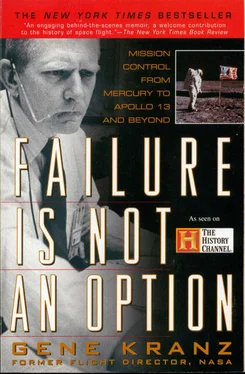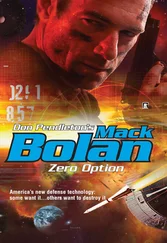The support team finished its systems checks and I sat down to check out the communications at my console. There had been no countdown delays and the capsule test conductor (the team leader for the capsule check-out) came on and reported, “The count is on schedule.” I then moved to Kraft’s console to check communications from his voice panel to the pad team. On this day, I was covering his tail, watching for problems while Chris went about the business of being the flight director. A half hour later, he arrived, dressed nattily as usual, regardless of the time of day. He made his standard comment: “How’s it going, young man?” I gave him a thumbs-up. He reached in the drawer for his headset, adjusted it, and then sat down.
At his console, Kraft projected the image of a general reviewing his forces prior to battle. The only time he showed any uncertainty was when the IBM engineers, Ira Saxe and Al Layton, periodically reported on the results of the network data flow testing. Tec Roberts and Carl Huss were monitoring the flow of data coming in from the tracking stations to Goddard Space Flight Center in Maryland, which in turn came down, via dedicated telephone lines, to the data display on the four plot boards in front of them. Saxe and Layton were concerned that there was a lot of ambient noise on the data lines and, like the rest of us, were not sure how a burst of static might affect the two computers at Goddard.
Saxe and Layton retested the lines and announced, “We had 270 failures out of the last 11,250 transmissions.” The perplexed expression on Kraft’s face indicated his annoyance. Softly, he asked Saxe, “Dammit, will you please tell me if that is okay?” That was the one thing they could not do. Getting a less than satisfactory answer, Kraft frowned, pretending to make sense of their report. Nobody knew how much bad data the computers could digest and still come up with acceptable answers. Computers just seemed to work, crash, or go off on tangents for no reason, with Huss and Roberts at their mercy.
Shepard had awakened at 1:00 A.M. and, after breakfast with John Glenn and Dr. Bill Douglas, began to undergo his physical exam, sensoring, and suiting. The weather was definitely better than the day before and a feeling of bullishness pervaded the control room. More controllers arrived and began making their checks.
Walt Williams, rumpled as usual, showed up about 2:00 A.M., after a quick, how-goes-it conversation with Shepard and Glenn. Chain-smoking, Walt talked briefly with Shorty Powers, then moved to his desk behind Kraft, his voice hoarse, grunting a question to Kraft. (Another sign of the times was that most people smoked in those days—and smoked a lot. Mercury Control would have been a nightmare for those who object to secondhand smoke because the air was regularly blue with tobacco haze.) Chris gave Walt a high sign, happy about the weather forecast.
The report that Shepard had entered the transfer van and was en route to the capsule gave me a chill. I passed the report to the controllers on the two tracking ships in the Atlantic about 280 miles down-range, north of Grand Bahama Island. When the van arrived at the pad, we saw a flurry around the base of the Redstone. It was surreal. The brilliant floodlights turned the night to day. The silver-suited Shepard paused, looked up, and then strode to the gantry for his sixty-five-foot elevator ride up to the capsule. I noted in the log that Shepard entered the capsule at 5:20 A.M. Again, I felt a shiver. This was history. I hoped that the other controllers were doing a better job of keeping their minds on their work than I was at that instant.
The countdown continued sporadically with five holds. During one of them I got Kraft his customary pint of milk to calm his ulcer. Williams spent more time outside checking on the weather, which was becoming increasingly overcast. With the launch gantry removed, the Redstone rocket stood starkly silent and alone on its platform.
It was now a little before seven o’clock in the morning. Looking up at the countdown clock I thought, If there ever was a time and place to get it all together it was now. It was time to kick in the afterburners and regain our confidence as Americans and as leaders.
Williams called a weather hold at launch minus fifteen minutes. Shortly thereafter, a problem developed in a Redstone power supply, and the decision was made to roll back the gantry and recycle the countdown to thirty-five minutes and hold. I got up to get a cup of coffee and stretch. Nerves were taut. It wasn’t a subject anyone talked about openly, but we in MCC fully expected to lose one or two astronauts in Mercury. The prayer at that moment was, “Not now, Lord, please, not today.”
Pilots don’t growl at their crew chiefs, so it came as a surprise when Shepard, in Freedom 7 , the tiny Mercury capsule atop the Redstone rocket, growled at his ground crew, “Why don’t you guys fix your problems and light this candle?”
The countdown had been holding for weather when our computer at Goddard crashed, requiring a complete check run. This was our third attempt to launch MR-3 and the pressure from Washington was mounting.
Goddard estimated a delay of ten minutes for the computer check. Kraft, sensing the tension that had built up in the control room over the delay, told his keyed-up team to “take five and get a cup of coffee.”
When I returned from my coffee break I lit another cigarette, and as the test conductors completed the recycle and announced the hold, the air-ground loop to the capsule came alive. To my astonishment, I heard the then popular comedian Bill Dana’s high-pitched parody of a reluctant astronaut:
“My name… José Jimenez… Do you know what it really takes to be an astronaut?”
“No, José. Tell me.”
“You should have courage and the right blood pressure and four legs.”
“Why four legs, José?”
“Because they really wanted to send a dog, but they decided that would be too cruel.”
As the José Jimenez routine continued, I punched the loops on my intercom to see if the recording was coming from Mercury Control. “Dammit,” I thought, “who the hell is playing a nightclub act on the countdown loops?” I sure hoped it was not coming from Mercury Control. If it was, I knew I would catch hell from both Kraft and Williams. I expelled a sigh of relief when it became clear that the comedy routine was being piped in from the blockhouse. A wonderful discovery: our German colleagues had a sense of humor. But was now the time to display it? It would be a distraction for the launch and flight team—and if the mission had been scrubbed, the bosses would have been on the warpath. As it turned out, however, Gordo Cooper and Bill Douglas, the surgeon, had conspired to patch Dana’s recording of José Jimenez into the capsule. They felt Shepard needed to relax a bit during the hold. This informality added a degree of unreality to the fact that we were only minutes away from launching the first American into space.
Not everybody was amused; I could see that Kraft was not happy. He did not like surprises that would distract his team. But by now the countdown was forgotten momentarily. The controllers were drinking coffee, joking and enjoying Bill Dana’s comic monologue. Dana had been dubbed the Eighth Astronaut by Shepard and Schirra and was a favorite of everyone working on Mercury. Later, in the bar after the launch, I would decide that this bit of humor was exactly what we needed to relax a bit and get loose and ready for launch. But I am damn sure the Russians wouldn’t have tolerated such shenanigans.
Shepard had been in the capsule for more than four hours when the count again resumed. It went smoothly and, after a brief hold at two minutes, continued toward liftoff. During the last seconds I saw Kraft’s hand move to the liftoff switch on his console. I just hoped he didn’t throw it early and start the mission clocks. At T-equals-zero, I glanced at Kraft’s TV, saw the rocket ignition, and then heard Shepard say, “Ahhh, Roger, liftoff and the clock is started.”
Читать дальше












